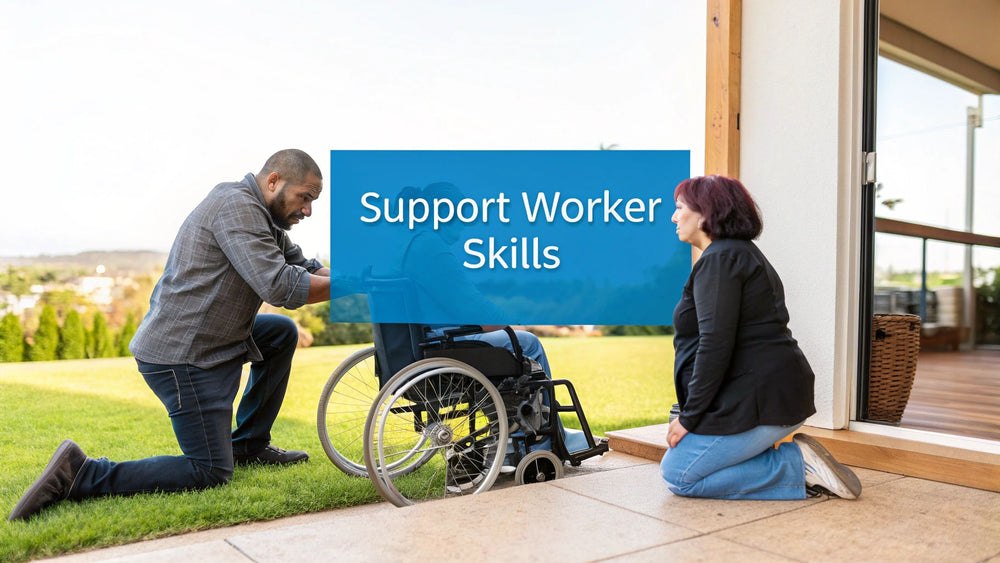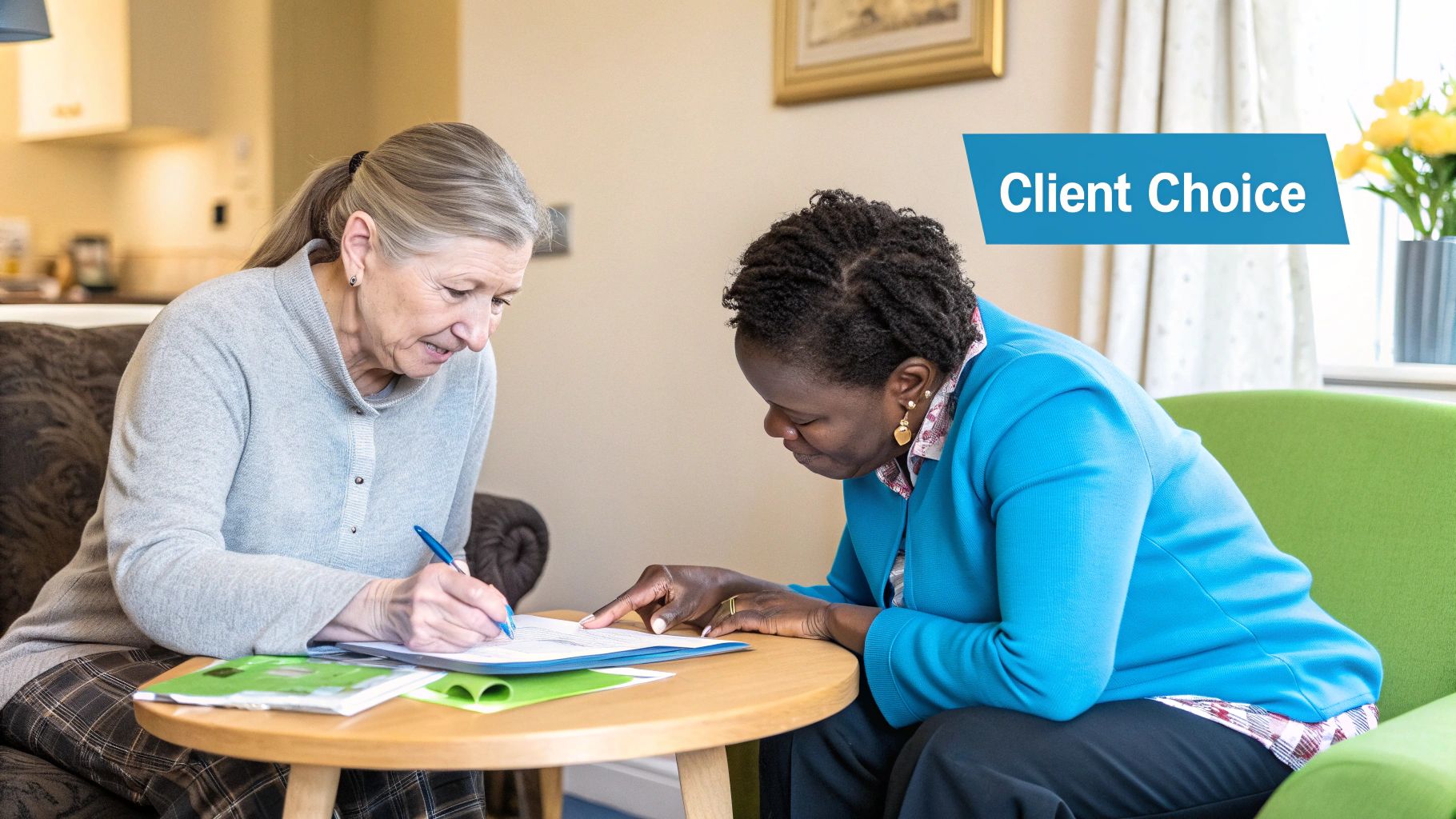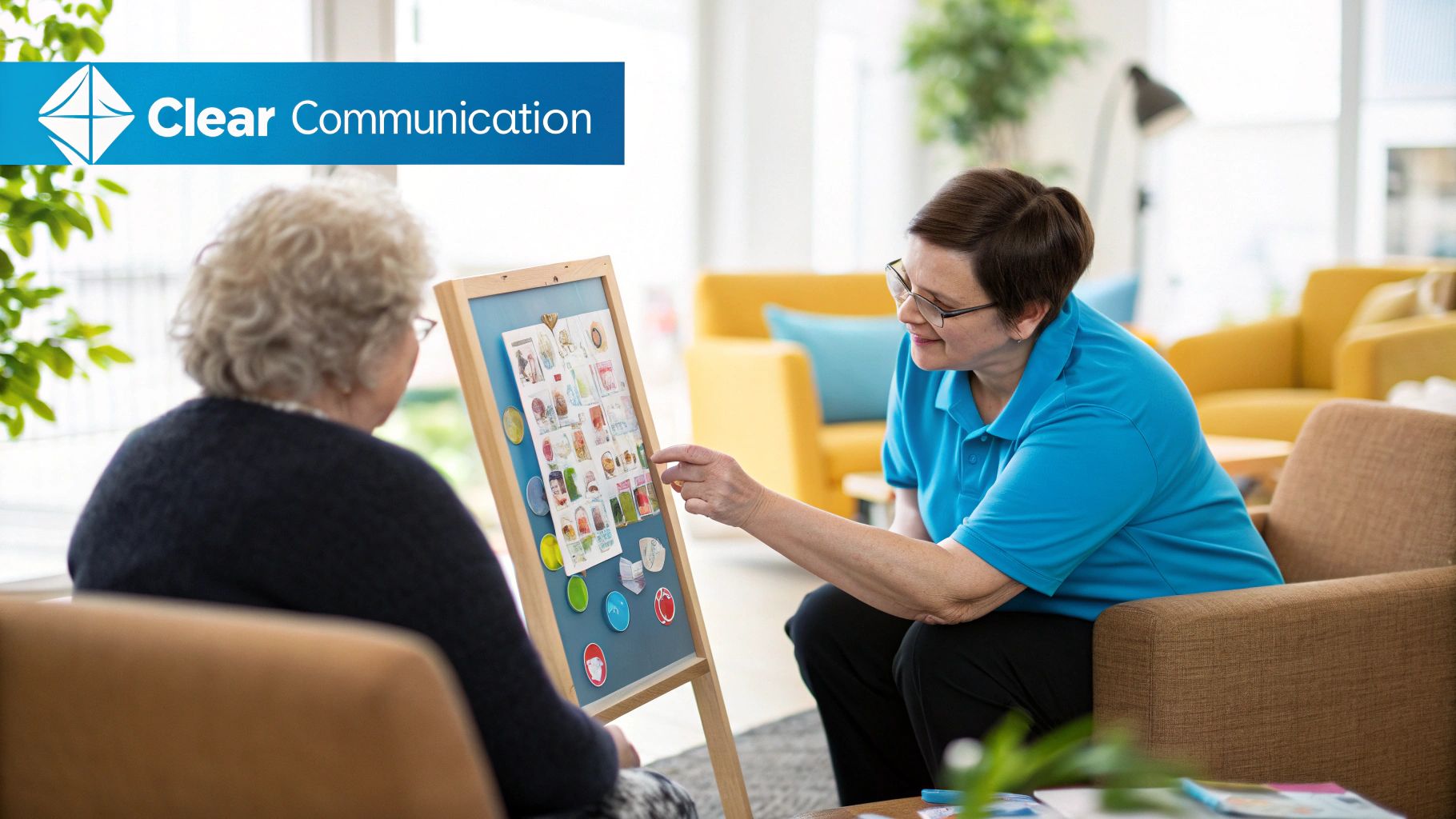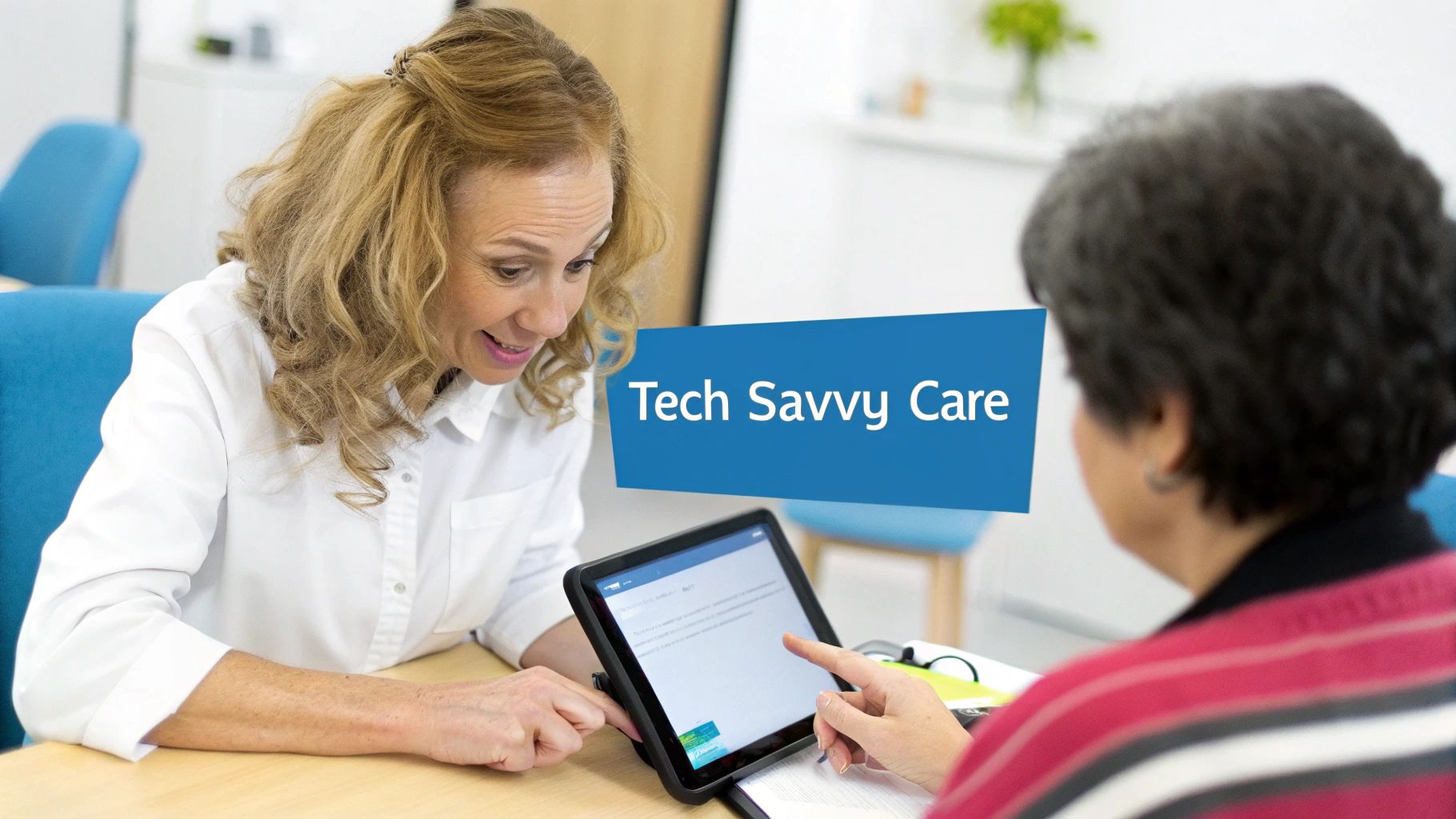8 Essential Disability Support Worker Skills for 2025

Choosing the right disability support worker is a decision that profoundly impacts daily life, independence, and overall wellbeing. While qualifications and experience are foundational, the true measure of an exceptional support worker lies in a more nuanced set of skills. These are the abilities that transform standard care into genuine, empowering support. This article moves beyond generic job descriptions to explore the critical disability support worker skills that make a significant difference.
We will provide a detailed look into the practical, interpersonal, and technical competencies that define high-quality, person-centred care. For individuals and families in Adelaide and regional South Australia seeking support, understanding these skills is crucial for identifying a professional who can not only meet needs but also foster growth and champion independence.
You will learn to recognise the subtle yet powerful indicators of an effective support worker. We'll break down eight essential skill sets, from adaptive communication and crisis management to cultural competency and assistive technology proficiency. Each section offers real-world examples and clear explanations, giving you the confidence to find a support partner who truly understands and respects your unique journey. This guide is designed to be your definitive resource for making an informed and empowered choice.
1. Empathy and Emotional Intelligence: The Heart of Connection
While often discussed together, empathy and emotional intelligence (EI) are distinct yet interconnected capabilities fundamental to quality disability support. Empathy is the ability to understand and share the feelings of another person, putting yourself in their shoes. Emotional intelligence is the broader skill of perceiving, using, understanding, managing, and handling your own emotions and those of others. For a disability support worker, these are not soft skills; they are core competencies that build trust and foster genuine connection.
These skills allow you to look beyond a diagnosis or a support plan and see the whole person. They are critical in moments of distress, frustration, or joy, enabling you to respond in a way that validates a person's feelings rather than just managing their behaviour.
How to Cultivate Deeper Empathy and EI
Developing these essential disability support worker skills is an ongoing process of self-reflection and active practice.
- Practice Active Listening: Instead of just hearing words, listen to understand the underlying emotions and needs. Pay attention to tone of voice, body language, and what is left unsaid.
- Seek Different Perspectives: Actively consume stories, books, and films created by people with disabilities. This helps challenge your own assumptions and broadens your understanding of diverse lived experiences.
- Engage in Self-Reflection: Regularly ask yourself how your own emotions and biases might be influencing your interactions. Acknowledging your feelings allows you to manage them constructively, ensuring your responses are centred on the client's needs, not your own emotional state.
Key Insight: True empathy isn’t about feeling sorry for someone; it's about connecting with their humanity. It’s the difference between saying, "That's a shame," and saying, "That sounds incredibly frustrating. How can we tackle this together?" This shift in approach transforms the support relationship from a service into a partnership.
2. Person-Centered Care and Advocacy: Empowering Choice and Autonomy
Person-centred care is a foundational philosophy that moves beyond treating a condition to supporting a whole person. It places the individual with disabilities at the centre of all decision-making, honouring their unique preferences, goals, and rights. This approach requires a disability support worker to act not just as a carer, but as a dedicated advocate, ensuring the client's voice is heard, respected, and amplified in every aspect of their support.
This skill is about championing a person's right to self-determination. For example, it means actively supporting a client’s desire to find employment by advocating for workplace accommodations, or respecting their choice to take calculated, everyday risks that contribute to their sense of independence and fulfilment. It is a commitment to seeing the person first, and their disability second.

How to Practice Genuine Person-Centred Care and Advocacy
Integrating this approach into your daily work transforms the support relationship from one of dependence to one of partnership and empowerment.
- Prioritise "Nothing About Us, Without Us": Always ask for a client's preferences before acting or making assumptions. Involve them directly in every meeting and decision related to their care plan, ensuring they are the primary author of their own life story.
- Become a Rights Champion: Take the initiative to learn about Australian disability rights legislation, the NDIS framework, and self-advocacy principles. This knowledge equips you to effectively advocate for your clients' entitlements and choices. To explore this topic further, you can read more about the shift towards person-centred in-home care.
- Document and Defend Choices: Clearly and respectfully document a client’s goals, preferences, and decisions in all formal care plans and communication logs. This written record serves as a powerful tool to ensure consistency and uphold their choices across the entire support team.
Key Insight: True advocacy isn't about speaking for someone; it's about making sure their own voice can be heard. It is the crucial difference between saying, "I don't think that's a good idea for you," and asking, "That sounds important to you. What support do you need to make it happen safely?" This mindset is one of the most vital disability support worker skills for fostering true independence.
3. Adaptive Communication Skills: The Bridge to Understanding
Effective communication is more than just exchanging words; it’s about ensuring a message is truly received and understood. Adaptive communication is the crucial ability to modify your communication style and methods to meet the diverse needs of individuals. For a disability support worker, this means moving beyond a one-size-fits-all approach and becoming a versatile communicator, capable of connecting with people who may have sensory, intellectual, or physical communication impairments.
This skill is the foundation of respectful and effective support. It empowers clients by ensuring they can express their needs, preferences, and feelings, regardless of their communication method. Whether using technology, visual aids, or simplified language, adaptive communication ensures every individual has a voice and the agency to direct their own support.

How to Build Your Adaptive Communication Toolkit
Mastering this vital disability support worker skill involves being observant, flexible, and willing to learn new methods. It's about finding what works best for each unique individual.
- Learn and Use Augmentative and Alternative Communication (AAC): Familiarise yourself with common AAC methods. This could involve learning basic Auslan (Australian Sign Language), using picture boards like a Picture Exchange Communication System (PECS), or becoming proficient with text-to-speech apps on a tablet.
- Simplify and Clarify Your Language: When supporting someone with a cognitive or intellectual disability, use clear, direct language. Avoid jargon, abstract ideas, or complex sentences. Break down instructions into single, actionable steps and use concrete examples to aid comprehension.
- Be Patient and Attentive: Communication can take more time for some individuals. Avoid rushing them or finishing their sentences. Allow for pauses, pay close attention to non-verbal cues, and always confirm you have understood their message correctly by paraphrasing it back to them. Developing these skills can be crucial for fostering better social interactions, as explained in our guide to inclusive activities for social skill development.
Key Insight: Adaptive communication is about prioritising connection over convention. It means you are willing to step outside your own comfort zone to enter someone else's world. The goal isn't just to be heard, but to ensure the other person feels seen, respected, and fully understood in a way that is meaningful to them.
4. Crisis Management and De-escalation: Navigating Challenging Moments
The ability to remain calm and effective during a crisis is one of the most critical disability support worker skills. Crisis management involves recognising the signs of escalating distress, implementing strategies to prevent a situation from worsening, and responding safely and compassionately when it does. This could range from managing a behavioural emergency rooted in sensory overload to providing immediate support during a medical event or psychological crisis.

Effective de-escalation is not about controlling a person; it's about helping them regain their own sense of control. This skill is vital for ensuring the safety and wellbeing of both the client and the support worker, transforming potentially volatile moments into opportunities to build deeper trust and understanding. For instance, successfully calming a client with autism during an overwhelming public outing demonstrates profound competence and care.
How to Develop Strong Crisis Management Skills
Building confidence in crisis situations comes from a combination of training, preparation, and mindful practice. Programs like those from the Crisis Prevention Institute (CPI) offer formal training in this area.
- Stay Calm and Centred: Your calm presence is a powerful tool. Speak in a low, steady voice and keep your body language non-threatening. Avoid sudden movements and give the person physical space.
- Focus on the Underlying Need: A crisis is often a communication of an unmet need. Use active listening to understand what is triggering the distress. Is it fear, pain, confusion, or sensory overload?
- Know Your Protocols: Be thoroughly familiar with your organisation’s crisis management procedures and emergency contacts. Knowing exactly who to call and what steps to take removes guesswork during high-stress moments. This is especially important when responding to scenarios requiring specialised NDIS mental health support.
Key Insight: The goal of de-escalation is not to 'win' or 'manage' a situation, but to create safety and restore calm. It requires shifting from a reactive mindset to a supportive one, focusing on validation and co-regulation. The most effective approach is often the one that prioritises the person's dignity and sense of security above all else.
5. Assistive Technology Proficiency: Empowering Independence
In an increasingly digital world, proficiency with assistive technology (AT) has become an indispensable disability support worker skill. AT refers to any device, software, or equipment that helps people with disabilities perform daily activities, communicate, and participate more fully in their communities. From simple adaptive utensils to complex communication software, these tools are powerful enablers of independence and choice. For a support worker, being tech-savvy is no longer a bonus; it's a core competency.
Your role extends beyond simply knowing what these tools are; it involves teaching, troubleshooting, and integrating them into a client’s daily life. This proficiency ensures that the technology doesn’t become another barrier but a bridge to greater autonomy. It means you can help set up a smart home device for a person with mobility limitations or guide a non-verbal client in using their communication tablet, transforming their ability to express their needs and desires.
How to Build Your Assistive Technology Skills
Developing competence with AT requires a commitment to continuous learning and a hands-on approach. These skills are practical and directly impact a client's quality of life.
- Stay Current Through Training: The world of AT is constantly evolving. Actively seek out webinars, workshops, and online courses from organisations like the Assistive Technology Industry Association. Follow the accessibility teams at major tech companies like Apple and Microsoft to learn about built-in features.
- Learn Basic Troubleshooting: You don't need to be an IT expert, but knowing how to perform basic troubleshooting for common devices (e.g., reconnecting a Bluetooth device, restarting an app, checking battery life) can resolve issues quickly and reduce client frustration.
- Start Simple and Build Confidence: Begin by mastering simpler, common devices like screen readers, voice command assistants, or adaptive remote controls. As your confidence grows, you can gradually introduce and support more complex technologies, ensuring both you and your client feel empowered, not overwhelmed.
Key Insight: Technology is only as good as its implementation. A state-of-the-art communication device is useless if the support worker doesn't know how to charge it or help the client navigate its menus. Your proficiency transforms an expensive gadget into a life-changing tool, making you an essential partner in your client’s journey towards independence.
6. Medication Management and Health Monitoring: A Pillar of Safety
The responsibility of assisting with medication and monitoring a client’s health is one of the most critical disability support worker skills. This involves much more than simply handing over a pill; it requires precision, vigilance, and a thorough understanding of an individual's specific health needs. It encompasses safely administering prescribed medications, observing for side effects or adverse reactions, and accurately documenting every detail. This skill is a cornerstone of providing safe and effective support, directly impacting a client's wellbeing and preventing potential medical emergencies.
This competency ensures that individuals with complex health conditions receive consistent and correct care, aligning with their healthcare team's directives. A support worker proficient in this area acts as a crucial link between the client and their medical providers, recognising subtle changes in a person's condition, such as signs of an infection or a negative drug interaction, and escalating concerns appropriately. This proactive monitoring helps maintain stability and prevent hospitalisations.
How to Excel in Medication Management and Health Monitoring
Building robust skills in this area requires a commitment to diligence, continuous learning, and strict adherence to established safety protocols.
- Follow the 'Five Rights' of Medication Administration: Always verify the right person, the right medication, the right dose, the right time, and the right route. This foundational principle, championed by organisations like the Institute for Safe Medication Practices, minimises the risk of errors.
- Keep Meticulous Records: Maintain a detailed and accurate medication administration record (MAR). Document every dose given, any client refusal, and all observations related to their health, such as changes in mood, appetite, or physical symptoms. This log is vital for accountability and for informing healthcare professionals.
- Stay Informed and Trained: Regularly update your training and knowledge on the medications your clients are taking. Understand their purpose, common side effects, and potential interactions. Proactively seek information and be aware of any required certifications or state-specific regulations for assisting with medications.
Key Insight: Excellent medication management is not just a procedural task; it's a dynamic process of observation and communication. It’s the difference between simply noting a client seems "off" and documenting specific, objective signs like "slight facial flushing and a temperature of 37.8°C two hours after their new antibiotic," which provides actionable information for a nurse or doctor.
7. Behavioural Support and Positive Reinforcement: Fostering Positive Change
Behavioural support involves using evidence-based strategies to understand the purpose behind a person's actions and to foster positive behaviours. Rather than simply reacting to challenging behaviours, this approach focuses on proactively teaching new skills and modifying the environment to better meet a person's needs. This skill is particularly crucial when supporting individuals with intellectual disabilities, autism, or acquired brain injuries, where communication and sensory processing differences can manifest in complex behaviours.
A core component is positive reinforcement, which means encouraging a desired behaviour by introducing a rewarding stimulus after it occurs. These advanced disability support worker skills shift the dynamic from management to empowerment, helping individuals develop constructive ways to communicate, cope, and participate in their communities. It’s about understanding the "why" behind a behaviour and collaboratively building better pathways forward.
How to Implement Effective Behavioural Support
Applying these principles requires consistency, patience, and a commitment to understanding the individual's unique needs and motivations.
- Focus on Skill-Building: Frame your support around teaching, not just reducing problematic actions. If a client becomes aggressive when frustrated, the goal is to teach them alternative ways to express that frustration, such as using a communication card or taking a break.
- Use Consistent Reinforcement: Ensure positive reinforcement is delivered more frequently than negative consequences. This could be verbal praise, earning points toward a desired activity, or other motivators identified in their support plan. Consistency across the entire support team is vital for success.
- Collect and Analyse Data: Objectively track when, where, and why specific behaviours occur. This data is invaluable for identifying triggers and patterns, allowing you and the support team, which may include behaviour analysts, to make informed adjustments to the support strategy.
Key Insight: True behavioural support is proactive, not reactive. It’s the difference between constantly managing meltdowns and creating a sensory-friendly environment with a visual schedule that prevents the anxiety that leads to them. This proactive stance builds a person's resilience and capacity for self-regulation. Learn more about how these strategies support NDIS capacity building.
8. Cultural Competency and Trauma-Informed Care: Supporting the Whole Person
Providing exceptional support means recognising that each person is shaped by their unique history, culture, and life experiences. Cultural competency is the ability to understand, respect, and effectively communicate with people from diverse cultural backgrounds. Trauma-informed care is an approach that acknowledges the widespread impact of trauma and creates pathways for recovery by prioritising physical, psychological, and emotional safety. For a disability support worker, these are not optional extras; they are foundational skills for providing safe, respectful, and person-centred care.
These intersecting skills allow you to understand how a person’s background influences their perception of disability, their health beliefs, and their relationship with support systems. Acknowledging a client's history with institutional trauma or cultural stigma, for example, is vital to building a trusting relationship and avoiding re-traumatisation. This approach ensures support is empowering, not just functional.
How to Practice Cultural Competency and Trauma-Informed Care
Integrating these principles into your daily practice requires intentional effort, humility, and a commitment to continuous learning.
- Avoid Assumptions, Ask Questions: Never assume you know what is best based on someone’s cultural background or diagnosis. Ask open-ended questions about their preferences, values, and what makes them feel safe and respected.
- Create Predictable and Safe Environments: Trauma can make the world feel unpredictable and unsafe. Foster safety by being consistent, communicating clearly about what to expect, and giving the person choices and control over their daily routines and environment.
- Educate Yourself on Different Histories: Take the initiative to learn about the cultural backgrounds of the people you support. This includes understanding the historical context of specific communities, such as the impact of institutionalisation or the unique experiences of Indigenous Australians with disability.
Key Insight: True support isn't one-size-fits-all; it's tailored to the individual's entire identity. It’s the difference between following a care plan rigidly and adapting it to honour a client's cultural fasting period or recognising that a client's mistrust of authority stems from past institutional trauma. This thoughtful approach is central to community empowerment through disability support.
Key Skills Comparison of Top 8 Disability Support Areas
| Skill/Approach | Implementation Complexity 🔄 | Resource Requirements ⚡ | Expected Outcomes 📊 | Ideal Use Cases 💡 | Key Advantages ⭐ |
|---|---|---|---|---|---|
| Empathy and Emotional Intelligence | Moderate - requires ongoing self-awareness and boundary management | Low - mainly interpersonal skills and reflection time | Builds trust, reduces anxiety, improves communication | General client interactions, emotional support | Enhances rapport, prevents burnout |
| Person-Centered Care and Advocacy | High - involves collaborative planning and negotiation | Moderate - time-intensive consultation and documentation | Greater client satisfaction and independence | Care planning, rights advocacy, complex decision making | Respects autonomy, promotes dignity |
| Adaptive Communication Skills | High - needs training in multiple methods and technologies | Moderate to high - may require assistive tech and materials | Improved client participation and reduced misunderstandings | Diverse communication needs, sensory impairments | Ensures access, supports self-expression |
| Crisis Management and De-escalation | High - requires extensive training and emotional resilience | Moderate - training and safety resources needed | Prevents escalation, maintains safety, reduces trauma | Behavioral emergencies, medical crises | Maintains safety, minimizes emergency needs |
| Assistive Technology Proficiency | Moderate to high - ongoing learning and technical skills | High - equipment, software, and specialized training | Increases independence, quality of life, and opportunities | Daily living support, communication facilitation | Keeps pace with technology, reduces caregiver burden |
| Medication Management and Health Monitoring | High - involves legal responsibility and technical knowledge | Moderate - training, certification, and coordination | Prevents errors, early problem detection, health support | Medication administration, chronic condition management | Enhances safety, reduces hospitalizations |
| Behavioral Support and Positive Reinforcement | High - requires specialized training and consistent application | Moderate - time for assessments and interventions | Reduces challenging behaviors, promotes skills and independence | Intellectual disabilities, autism, behavioral challenges | Evidence-based, prevents restrictive methods |
| Cultural Competency and Trauma-Informed Care | Moderate to high - ongoing education and organizational support | Low to moderate - training and cultural liaison involvement | Improves trust, reduces retraumatization, promotes equity | Diverse cultural backgrounds, trauma histories | Ensures respectful, equitable care |
Integrating Your Skills for Human-First Support
Becoming an exceptional disability support worker is not about mastering individual skills in isolation. It is about weaving them together into a seamless, holistic approach that prioritises the individual. The journey from being a competent carer to a truly transformative support professional lies in this integration, where empathy informs communication, technological proficiency enhances personal care, and cultural awareness shapes every interaction. The disability support worker skills we have explored, from person-centred advocacy to crisis de-escalation, are not just items on a checklist; they are interconnected pillars that support a foundation of trust, dignity, and empowerment.
Think of these abilities as a dynamic toolkit. You might use your adaptive communication skills to understand a non-verbal client's needs, then leverage your assistive technology proficiency to help them express themselves more fully. Your deep-seated empathy allows you to recognise the early signs of distress, enabling you to apply crisis management techniques proactively and compassionately. This synthesis is where the real impact is made, turning routine support into a partnership that genuinely enhances a person’s quality of life and autonomy.
Weaving a Tapestry of Support
The most effective support workers understand that their role is fluid. One moment requires the precision of medication management, while the next calls for the patience of positive behavioural support. The thread connecting these diverse demands is a commitment to seeing the whole person, not just their diagnosis or their immediate needs. It means recognising that a person's cultural background, personal history, and individual preferences are just as important as their physical health requirements.
This integrated approach moves beyond task-based assistance and into the realm of human-first support. It is the difference between simply administering care and actively co-creating a life of choice and opportunity with the person you support. It is about fostering an environment where individuals in Adelaide and regional South Australia feel safe, heard, and valued.
Your Path Forward: From Knowledge to Action
Mastering these essential disability support worker skills is an ongoing process of learning, reflection, and practice. To continue your development, consider these actionable next steps:
- Seek Reflective Feedback: Regularly ask for feedback from clients, their families, and your supervisors. Use this insight to identify areas where your skills can be better integrated. For example, how can you better apply trauma-informed principles during health monitoring?
- Pursue Specialised Training: Enrol in workshops or courses focusing on specific areas like advanced assistive technologies, complex behavioural support, or cultural competency with First Nations communities.
- Engage in Peer Mentoring: Connect with experienced support workers. Share scenarios, discuss challenges, and learn how they weave different skills together to handle complex situations in Supported Independent Living (SIL) or community access settings.
Ultimately, the goal is to internalise these skills so they become second nature. When your actions are consistently guided by empathy, respect, and a deep understanding of person-centred values, you are not just performing a job; you are making a profound and positive difference in someone’s world, empowering them to live the life they choose.
Finding a provider that values and nurtures these essential skills in their team is crucial for receiving high-quality, personalised support. Vana Care is committed to building a team of compassionate and highly skilled support workers dedicated to a human-first approach. If you are looking for disability support in Adelaide that truly understands the importance of an integrated skill set, connect with the team at Vana Care to see the difference firsthand.


